Module 2 Unit 5 Open Day Period 2 Words 同步词汇及拓展延伸 牛津上海版六年级英语上册 课件 (共20张PPT)
文档属性
| 名称 | Module 2 Unit 5 Open Day Period 2 Words 同步词汇及拓展延伸 牛津上海版六年级英语上册 课件 (共20张PPT) |
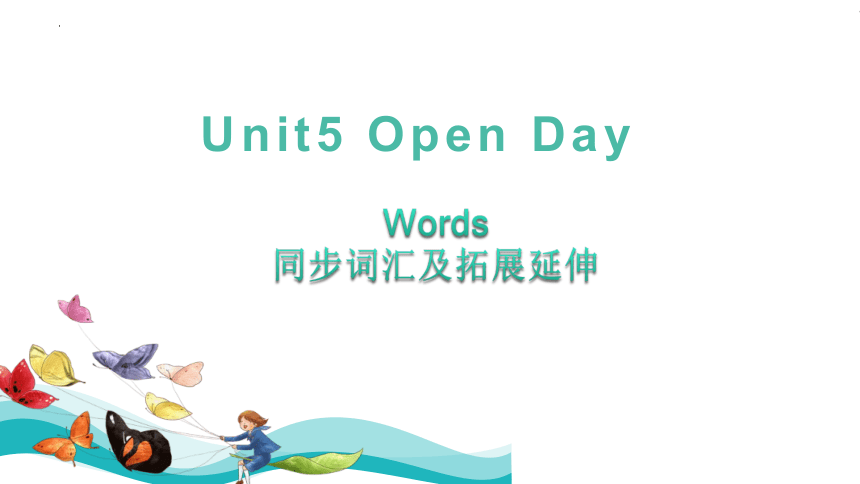
|
|
| 格式 | pptx | ||
| 文件大小 | 4.7MB | ||
| 资源类型 | 教案 | ||
| 版本资源 | 牛津上海版(试用本) | ||
| 科目 | 英语 | ||
| 更新时间 | 2023-09-23 15:17:31 | ||
图片预览

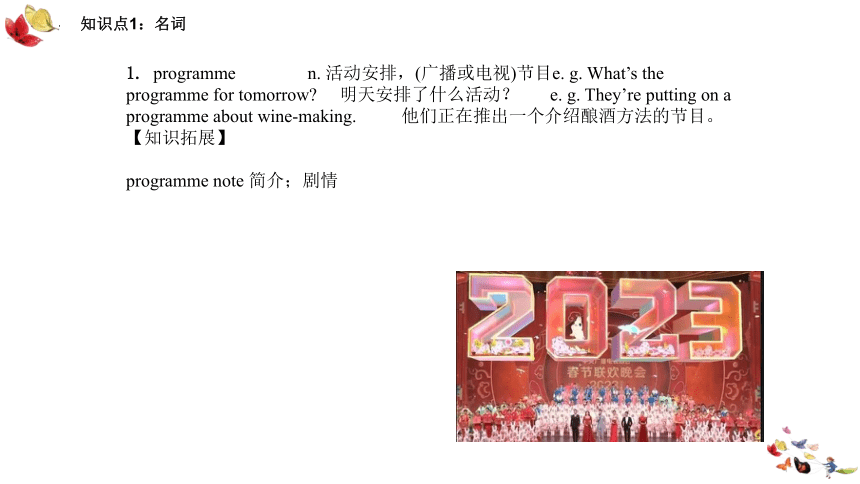
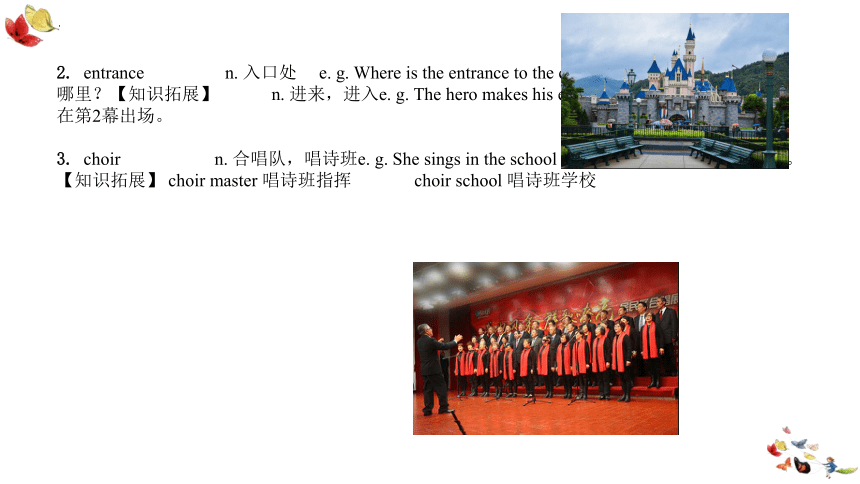
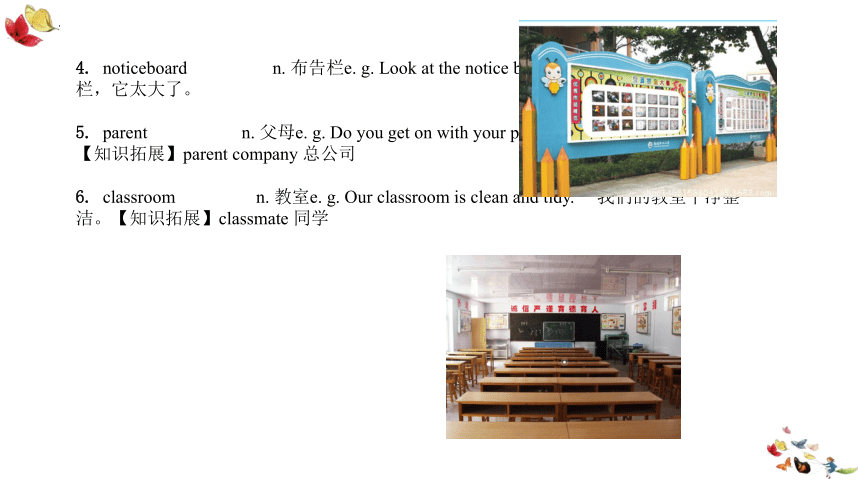

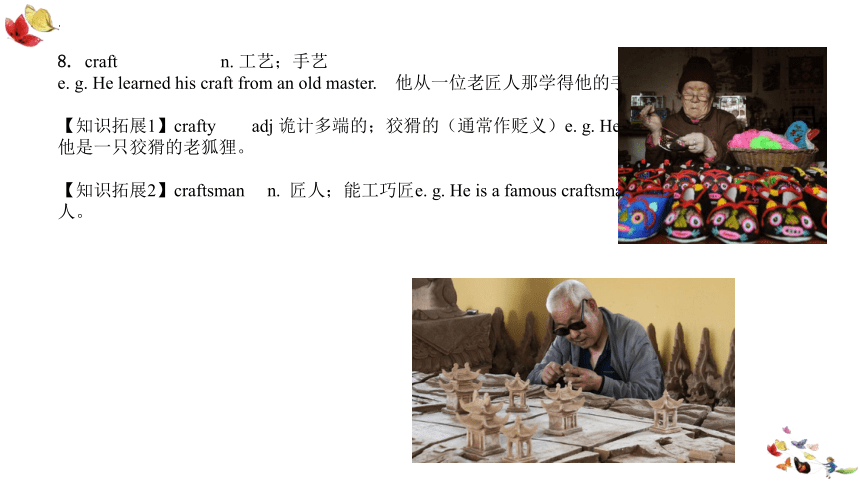
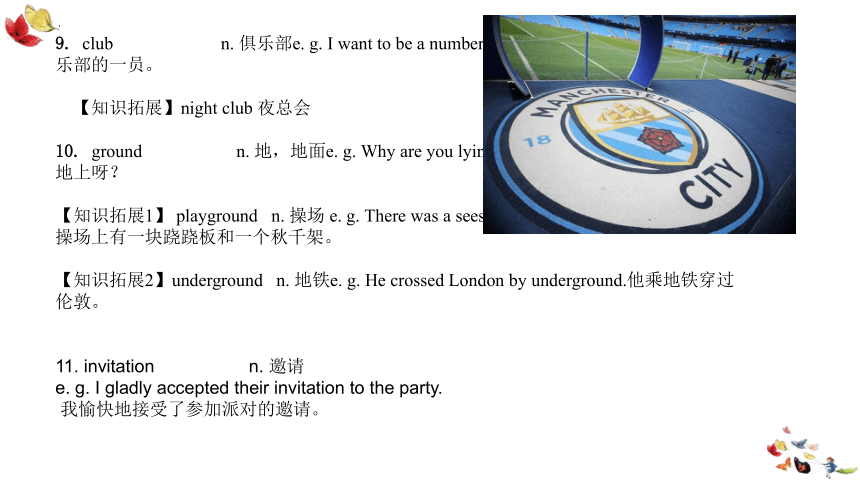
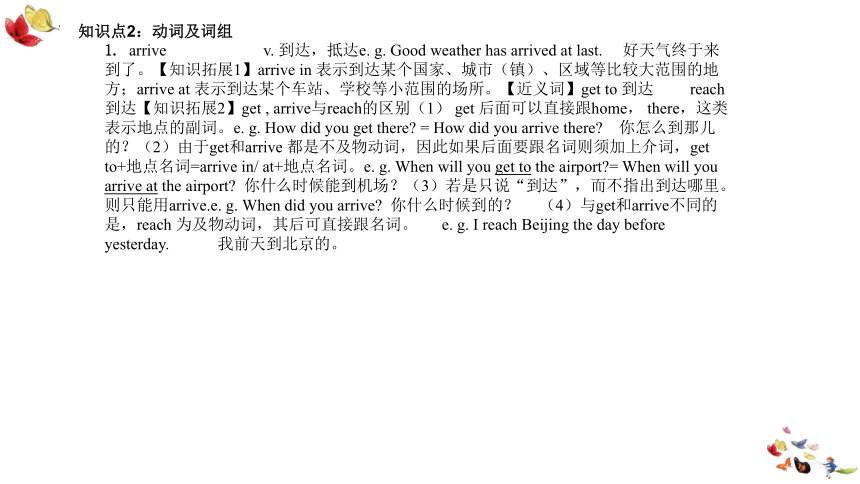
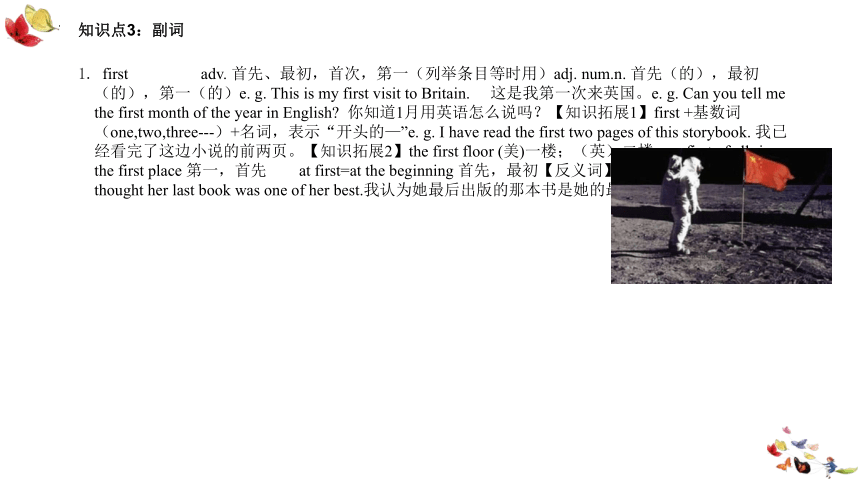
文档简介
(共20张PPT)
Words
同步词汇及拓展延伸
Unit5 Open Day
1. programme n. 活动安排,(广播或电视)节目e. g. What’s the programme for tomorrow 明天安排了什么活动? e. g. They’re putting on a programme about wine-making. 他们正在推出一个介绍酿酒方法的节目。【知识拓展】
programme note 简介;剧情
知识点1:名词
2. entrance n. 入口处 e. g. Where is the entrance to the cave 这个洞穴的入口在哪里?【知识拓展】 n. 进来,进入e. g. The hero makes his entrance in Act 2. 这位英雄在第2幕出场。
3. choir n. 合唱队,唱诗班e. g. She sings in the school choir. 她在学校合唱队唱歌。【知识拓展】 choir master 唱诗班指挥 choir school 唱诗班学校
4. noticeboard n. 布告栏e. g. Look at the notice board. It’s too large. 看布告栏,它太大了。
5. parent n. 父母e. g. Do you get on with your parents 你和父母合得来吗?【知识拓展】parent company 总公司
6. classroom n. 教室e. g. Our classroom is clean and tidy. 我们的教室干净整洁。【知识拓展】classmate 同学
7. project n. 习作项目e. g. Look at our class project. 看看我们的课程习作项目。
【知识拓展】 n. 规划;工程;事业e. g. That is a project to establish a new national park. 那是建立一个新的国家公园的工程。
8. craft n. 工艺;手艺
e. g. He learned his craft from an old master. 他从一位老匠人那学得他的手艺。
【知识拓展1】crafty adj 诡计多端的;狡猾的(通常作贬义)e. g. He’s a crafty old fox. 他是一只狡猾的老狐狸。
【知识拓展2】craftsman n. 匠人;能工巧匠e. g. He is a famous craftsman. 他是著名的匠人。
9. club n. 俱乐部e. g. I want to be a number of that club. 我想成为那个剧乐部的一员。
【知识拓展】night club 夜总会
10. ground n. 地,地面e. g. Why are you lying on the ground 你怎么躺在地上呀?
【知识拓展1】 playground n. 操场 e. g. There was a seesaw and a swing in the playground. 操场上有一块跷跷板和一个秋千架。
【知识拓展2】underground n. 地铁e. g. He crossed London by underground.他乘地铁穿过伦敦。
11. invitation n. 邀请
e. g. I gladly accepted their invitation to the party.
我愉快地接受了参加派对的邀请。
知识点2:动词及词组
1. arrive v. 到达,抵达e. g. Good weather has arrived at last. 好天气终于来到了。【知识拓展1】arrive in 表示到达某个国家、城市(镇)、区域等比较大范围的地方;arrive at 表示到达某个车站、学校等小范围的场所。【近义词】get to 到达 reach 到达【知识拓展2】get , arrive与reach的区别(1) get 后面可以直接跟home, there,这类表示地点的副词。e. g. How did you get there = How did you arrive there 你怎么到那儿的?(2)由于get和arrive 都是不及物动词,因此如果后面要跟名词则须加上介词,get to+地点名词=arrive in/ at+地点名词。e. g. When will you get to the airport = When will you arrive at the airport 你什么时候能到机场?(3)若是只说“到达”,而不指出到达哪里。则只能用arrive.e. g. When did you arrive 你什么时候到的? (4)与get和arrive不同的是,reach 为及物动词,其后可直接跟名词。 e. g. I reach Beijing the day before yesterday. 我前天到北京的。
知识点3:副词
1. first adv. 首先、最初,首次,第一(列举条目等时用)adj. num.n. 首先(的),最初(的),第一(的)e. g. This is my first visit to Britain. 这是我第一次来英国。e. g. Can you tell me the first month of the year in English 你知道1月用英语怎么说吗?【知识拓展1】first +基数词(one,two,three---)+名词,表示“开头的—”e. g. I have read the first two pages of this storybook. 我已经看完了这边小说的前两页。【知识拓展2】the first floor (美)一楼;(英)二楼 first of all=in the first place 第一,首先 at first=at the beginning 首先,最初【反义词】last adj. 最后的e. g. I thought her last book was one of her best.我认为她最后出版的那本书是她的最佳著作之一。
2. finally adv. 最后e. g. We must settle this matter finally. 我们必须彻底解决这一问题。 【近义词】at last 最终,最后 in the end 终于,最后
3. yesterday adv. 昨天n. 昨天e. g. Where were you yesterday morning 昨天上午你在哪里? e. g. Yesterday was my birthday. 昨天是我的生日。
知识点4:形容词
1.next adj.紧接着,随后adv. 紧接着,随后;其次 e. g. How far is it to the next petrol station 最近的加油站,离此地多远? e. g. What did you do next 随后你做了什么? e. g. The next oldest building is the church. 第二古老的建筑物是那个教堂。
【知识拓展1】用于疑问词之后表示惊讶 e. g. You’re learning to be a pilot. Whatever next! 你竟然学飞行!还想怎么着!
知识点5:句型
1.用将来时谈论将来的事情:will + 动词原形,一般将来时表示将要发生的动作。 e. g. The school choir will sing at two fifty. 学校的合唱队将在下午2:50分开始演唱。
2.用副词表达事情的进展顺序,称为时序副词。e. g. First……;Next......;Then......;After that......;Finally...... 首先……;接下来......; 然后......;在那之后......;最后......
3.学习用介词表示时间。e. g. 2:40------twenty to three/two fortye. g. 2:20------twenty past two/two twenty
4.表示顺序的数词称为序数词;在哪一栋楼和房间的门牌号用基数词,在哪一层楼用序数词。 e. g. room1002 1002房间 e. g. on the second floor 【美】在二楼;【英】在三楼 【知识拓展】 (1) 一般在基数词后面加th构成序数词,但有些词有特殊变化:one→first, two→second, three→third, five→fiftheight→eighth, nine→ninth, twelve→twelfth (2) 20至90这样的整十数字变为序数词时,只需把词尾的字母y改为ie, 再加th即可。 e. g. twenty→twentieth (3) 在表达第几十几,第几百几时,只需将个位改为序数词即可。 e. g. twenty-two→twenty-second (4) 序数词总是和定冠词the连用。 e. g. the first lesson
5.Kitty and her classmates took some photos for the English Club on the Open Day.
Kitty和她的同学在家长开放日为英语俱乐部拍了一些照片。【注释】这一句是一般过去时,句中took是take的过去式,表示过去发生的事情。
本单元要牢记的动词过去式还有:listen→listened, visit→visited,arrive→arrived, have→had, look→looked
Using
1.In 10 years’ time, Helen (be) a doctor.2.I believe he (come) back soon.3.Betty (go) shopping this Sunday.4.I (finish) the task in two hours.5.The students (do) their homework from four to five this afternoon.6.Tuesday is the (three) day of a week.7.My father (leave) for Beijing tomorrow morning.8.We will the problem in the afternoon. (discussion)9.The fifth day of the lunar month is the Dragon Boat Festival. (five)10.My mother will here today. (is)11.His company will certainly grow and . (success)12.Will the little baby 10 kilograms when she is 5 months old (weight)13.What time will Uncle Wang We want to meet him at the airport. (arrival)14.Look at all the dark clouds! it (rain) 15.Would you like (attend) the meeting tomorrow Your presence (出席) (make) us very happy.16.If we don’t stop polluting the oceans, all the sea animals .(die)17.Susan will 46 kilograms when she is 20 years old. (weight)18.Tomorrow will be my brother’s birthday. (twenty)19.If he (come) tomorrow, we will tell him if we (let) him go camping with us.20.—The newest camera is so cool! But I can’t afford (buy) it!—If you wait until the sales season, it (not cost) you too much.
Keys
1.will be
【详解】句意:10年后,海伦将成为一名医生。根据“In 10 years’ time”可知,时态是一般将来时,结构是will do。故填will be。
2.will come
【详解】句意:我相信他很快就会回来。根据句中“soon”可知,句子应用一般将来时态,结构是will后跟动词原形。这里用will come。故填will come。
3.will go
【详解】句意:Betty这周日要去购物。根据“this Sunday”可知,时态是一般将来时,构成:主语+will+动词原形,动词短语go shopping“去购物”,故填will go。
4.will finish
【详解】句意:我将在两小时内完成这项任务。根据“in two hours”可知,句子要用一般将来时,用结构“will+动词原形”,故填will finish。
5.will do
【详解】句意:今天下午学生们将从4点到5点做作业。根据“this afternoon”可知,句子用一般将来时结构,故填will do。
6.third
【详解】句意:周二是一周的第三天。根据“the”和单数名词“day”可知,名词前用序数词third,表达“第三天”。故填third。
7.is going to leave/will leave
【详解】句意:我爸爸明天早上要前往北京。根据“tomorrow morning.”可知句子是一般将来时:be going to/will+动词原形。主语是单数,be动词用is。故填is going to leave/will leave。
8.discuss
【详解】句意:我们将在下午讨论这个问题。discussion“讨论”,名词;根据题干可知,助动词will后面用动词原形作谓语,构成一般将来时态;与discussion所对应的动词是discuss。故填discuss。
9.fifth
【详解】句意:农历五月初五是端午节。根据句意可知,本题表达“农历五月初五”;根据所学可知,农历五月用序数词表示,结合所提供单词five是基数词可知,应该用其序数词fifth;the fifth day of the fifth lunar month“农历五月初五”。故填fifth。
10.be
【详解】句意:我妈妈今天会在这里。will后接原型,应用is的原型be。故填be。
11.succeed
【详解】句意:他的公司一定会发展壮大并取得成功。根据“will certainly grow and...”可知,此处应用动词原形和“grow”一起作句子的谓语,success的动词形式是succeed。故填succeed。
12.weigh
【详解】句意:这个小婴儿5个月大的时候体重会达到10公斤吗?此句是一般将来时的一般疑问句,will后面跟动词原形,weight的动词形式是weigh。故填weigh。
13.arrive
【详解】句意:王叔叔什么时候到?我们想去机场接他。arrival“到达”,名词;will后加动词原形arrive“到达”。故填arrive。
14. Is going to rain
【详解】句意:看那些乌云!会下雨吗?根据“Look at all the dark clouds!”可知有乌云应是将会下雨,用一般将来时,结构be going to表示有迹象发生某事,一般疑问句中Is置于句首,首字母大写。故填Is;going to rain。
15. to attend will make
【详解】句意:你愿意参加明天的会议吗?你的到来将使我们非常高兴。根据固定搭配“would like to do sth.:想要做某事”可知,第一空to attend符合句意;再者根据“the meeting tomorrow”可知,出席这件事情还未发生,时态是一般将来时,第二空will make符合句意。故填to attend;will make。
16.will die
【详解】句意:如果我们不停止污染海洋,所有的海洋动物都会死亡。句子是if引导的条件状语从句,时态遵循“主将从现”的原则,此处应用一般将来时,故填will die。
17.weigh
【详解】句意:苏珊20岁时体重将达到46公斤。分析句子结构可知,此处是谓语,需用动词,weight意为“重量”,名词,其动词为weigh,will后跟动词原形。故填weigh。
18.twentieth
【详解】句意: 明天是我哥哥的二十岁生日。twenty是基数词,这里是表示生日,应用序数词twentieth。故填twentieth。
19. comes will let
【详解】句意:如果他明天来,我们就告诉他是否让他和我们一起去露营。第一空,是if引导的条件状语从句,遵循主将从现原则,此处是从句,因此填一般现在时态形式,且主语he是第三人称单数,因此填comes;第二空是宾语从句,结合句意可知,此处表示“我们就告诉他是否将会让他和我们一起去露营”,因此填一般将来时态形式will let。故填comes;will let。
20. to buy won’t cost
【详解】句意:——这台最新的相机太酷了!但是我买不起!——如果你等到销售季节再买,不会花你太多钱的。can’t afford to do sth.“负担不起做某事”,第一空用to buy;if引导的条件状语从句遵循主将从现原则,主句用一般将来时,其结构为will do,will与not缩写为won’t,第二空用won’t cost。故填to buy;won’t cost。
Using
health some homework has need interesting after students big classes
With the “double reduction” policy (双减政策) comes out, students start new school life.A girl named Diana from Wildfield Middle School doesn’t 21 to get up early. At 7:00, She has a 22 breakfast at home, and then she goes to school by bike. 23 begin at 8:00. Diana has four classes in the morning. At 11:45, she has lunch at school. The food is delicious and good for their 24 . After that, she and her classmates take a nap in the classroom for half an hour. In the afternoon, she 25 only two classes. After classes, students in Diana’s school can have many 26 after-school activities (活动). Diana likes playing volleyball in the sports club. Differently, they can have 27 colorful after-school clubs (俱乐部) every day now. Diana thinks 28 learn much in these clubs. 29 school, they have little homework and they have more free time to enjoy their clubs. Diana says happily, “Now, we have no weekly or monthly tests. We can also finish our 30 at school because of a new after-school service (服务).”
Keys
21.need 22.big 23.Classes 24.health 25.has 26.interesting 27.some 28.students 29.After 30.homework
【分析】本文向我们介绍双减政策下学生的新生活。
21.句意:一个来自Wildfield中学叫戴安娜的女孩从不需要早起。前文提到双减政策,所以现在学生不需要早起,故填need。
22.句意:七点,她在家吃了一顿丰盛的早餐,然后她骑自行车去上学。此处作定语修饰“breakfast”,big符合语境,a big breakfast“一顿丰盛的早餐”,故填big。
23.句意:八点开始上课。根据“Diana has four classes in the morning.”可知,此处介绍戴安娜八点钟开始上课,此处表示复数含义,使用名词复数形式,句首需大写首字母,故填Classes。
24.句意:食物很美味,对他们的健康有好处。根据“The food is delicious and good for their...”可知,对健康有好处,用health作宾语,故填health。
25.句意:下午,她只有两节课。根据“In the afternoon, she...only two classes.”可知,下午有两节课,故填has。
26.句意:课后,戴安娜学校的学生可以有许多有趣的课外活动。此处作定语修饰“after-school activities”,备选词interesting符合语境,故填interesting。
27.句意:不同的是,他们现在每天都可以有一些丰富多彩的课外俱乐部。根据“they can have...colorful after-school clubs”可知,他们有一些丰富多彩的课外俱乐部,备选词some修饰after-school clubs,故填some。
28.句意:戴安娜认为学生们在这些俱乐部里学到了很多。根据“Diana thinks...learn much in these clubs.”可知,学生们在这些俱乐部里学到了很多,在从句中作主语,故填students。
29.句意:放学后,他们有很少的家庭作业,他们有更多的自由时间享受他们的俱乐部。根据“...school, they have little homework”可知,放学后有很少的作业,after school“放学后”,句首需大写首字母,故填After。
30.句意:我们也可以在学校完成作业,因为有了新的课后服务。根据“We can also finish our...at school”可知,在学校完成作业,用备选词homework作宾语,故填homework。
Using
A.begin B.program C. end D. pleased E. call
This is a message for Marco Daniel. My name’s David Dolby. I’m sorry I missed your 31 . I understand that you want some information about the volleyball club. The club meets once a week, on Wednesday evening. There are sometimes matches on Sunday morning, but those are just for our team players. Our meetings 32 at eight, and they are about two hours long, so we finish at ten. People like to get home in time for the 10:15 sports 33 on television. We meet in the Jubilee Hall in Park Lane, behind the High Street. The hall doesn’t have very good heating, so you’ll need to bring a coat to put on afterwards. It’s also quite expensive to rent, so our players pay £2.75 each week. I hope this answers all your questions and we’ll be very 34 to see you at our next meeting.
Keys
31.E 32.A 33.B 34.D
【导语】本文主要介绍了排球俱乐部的信息。
31.句意:很抱歉我错过了你的电话。根据“I missed your...”以及所给词可知是错过了电话,call“电话”符合。故选E。
32.句意:我们的会议八点开始。根据“at eight...we finish at ten”以及所给词可知会议在8点开始,begin“开始”符合。故选A。
33.句意:人们喜欢及时回家看10:15的电视体育节目。根据“sports...on television”以及所给词可知是在电视上看节目,program“节目”符合。故选B。
34.句意:我希望这能回答你的所有问题,我们很高兴在下次会议上见到你。根据“see you at our next meeting”以及所给词可知是很高兴见到你,pleased“开心的”符合。故选D。
Words
同步词汇及拓展延伸
Unit5 Open Day
1. programme n. 活动安排,(广播或电视)节目e. g. What’s the programme for tomorrow 明天安排了什么活动? e. g. They’re putting on a programme about wine-making. 他们正在推出一个介绍酿酒方法的节目。【知识拓展】
programme note 简介;剧情
知识点1:名词
2. entrance n. 入口处 e. g. Where is the entrance to the cave 这个洞穴的入口在哪里?【知识拓展】 n. 进来,进入e. g. The hero makes his entrance in Act 2. 这位英雄在第2幕出场。
3. choir n. 合唱队,唱诗班e. g. She sings in the school choir. 她在学校合唱队唱歌。【知识拓展】 choir master 唱诗班指挥 choir school 唱诗班学校
4. noticeboard n. 布告栏e. g. Look at the notice board. It’s too large. 看布告栏,它太大了。
5. parent n. 父母e. g. Do you get on with your parents 你和父母合得来吗?【知识拓展】parent company 总公司
6. classroom n. 教室e. g. Our classroom is clean and tidy. 我们的教室干净整洁。【知识拓展】classmate 同学
7. project n. 习作项目e. g. Look at our class project. 看看我们的课程习作项目。
【知识拓展】 n. 规划;工程;事业e. g. That is a project to establish a new national park. 那是建立一个新的国家公园的工程。
8. craft n. 工艺;手艺
e. g. He learned his craft from an old master. 他从一位老匠人那学得他的手艺。
【知识拓展1】crafty adj 诡计多端的;狡猾的(通常作贬义)e. g. He’s a crafty old fox. 他是一只狡猾的老狐狸。
【知识拓展2】craftsman n. 匠人;能工巧匠e. g. He is a famous craftsman. 他是著名的匠人。
9. club n. 俱乐部e. g. I want to be a number of that club. 我想成为那个剧乐部的一员。
【知识拓展】night club 夜总会
10. ground n. 地,地面e. g. Why are you lying on the ground 你怎么躺在地上呀?
【知识拓展1】 playground n. 操场 e. g. There was a seesaw and a swing in the playground. 操场上有一块跷跷板和一个秋千架。
【知识拓展2】underground n. 地铁e. g. He crossed London by underground.他乘地铁穿过伦敦。
11. invitation n. 邀请
e. g. I gladly accepted their invitation to the party.
我愉快地接受了参加派对的邀请。
知识点2:动词及词组
1. arrive v. 到达,抵达e. g. Good weather has arrived at last. 好天气终于来到了。【知识拓展1】arrive in 表示到达某个国家、城市(镇)、区域等比较大范围的地方;arrive at 表示到达某个车站、学校等小范围的场所。【近义词】get to 到达 reach 到达【知识拓展2】get , arrive与reach的区别(1) get 后面可以直接跟home, there,这类表示地点的副词。e. g. How did you get there = How did you arrive there 你怎么到那儿的?(2)由于get和arrive 都是不及物动词,因此如果后面要跟名词则须加上介词,get to+地点名词=arrive in/ at+地点名词。e. g. When will you get to the airport = When will you arrive at the airport 你什么时候能到机场?(3)若是只说“到达”,而不指出到达哪里。则只能用arrive.e. g. When did you arrive 你什么时候到的? (4)与get和arrive不同的是,reach 为及物动词,其后可直接跟名词。 e. g. I reach Beijing the day before yesterday. 我前天到北京的。
知识点3:副词
1. first adv. 首先、最初,首次,第一(列举条目等时用)adj. num.n. 首先(的),最初(的),第一(的)e. g. This is my first visit to Britain. 这是我第一次来英国。e. g. Can you tell me the first month of the year in English 你知道1月用英语怎么说吗?【知识拓展1】first +基数词(one,two,three---)+名词,表示“开头的—”e. g. I have read the first two pages of this storybook. 我已经看完了这边小说的前两页。【知识拓展2】the first floor (美)一楼;(英)二楼 first of all=in the first place 第一,首先 at first=at the beginning 首先,最初【反义词】last adj. 最后的e. g. I thought her last book was one of her best.我认为她最后出版的那本书是她的最佳著作之一。
2. finally adv. 最后e. g. We must settle this matter finally. 我们必须彻底解决这一问题。 【近义词】at last 最终,最后 in the end 终于,最后
3. yesterday adv. 昨天n. 昨天e. g. Where were you yesterday morning 昨天上午你在哪里? e. g. Yesterday was my birthday. 昨天是我的生日。
知识点4:形容词
1.next adj.紧接着,随后adv. 紧接着,随后;其次 e. g. How far is it to the next petrol station 最近的加油站,离此地多远? e. g. What did you do next 随后你做了什么? e. g. The next oldest building is the church. 第二古老的建筑物是那个教堂。
【知识拓展1】用于疑问词之后表示惊讶 e. g. You’re learning to be a pilot. Whatever next! 你竟然学飞行!还想怎么着!
知识点5:句型
1.用将来时谈论将来的事情:will + 动词原形,一般将来时表示将要发生的动作。 e. g. The school choir will sing at two fifty. 学校的合唱队将在下午2:50分开始演唱。
2.用副词表达事情的进展顺序,称为时序副词。e. g. First……;Next......;Then......;After that......;Finally...... 首先……;接下来......; 然后......;在那之后......;最后......
3.学习用介词表示时间。e. g. 2:40------twenty to three/two fortye. g. 2:20------twenty past two/two twenty
4.表示顺序的数词称为序数词;在哪一栋楼和房间的门牌号用基数词,在哪一层楼用序数词。 e. g. room1002 1002房间 e. g. on the second floor 【美】在二楼;【英】在三楼 【知识拓展】 (1) 一般在基数词后面加th构成序数词,但有些词有特殊变化:one→first, two→second, three→third, five→fiftheight→eighth, nine→ninth, twelve→twelfth (2) 20至90这样的整十数字变为序数词时,只需把词尾的字母y改为ie, 再加th即可。 e. g. twenty→twentieth (3) 在表达第几十几,第几百几时,只需将个位改为序数词即可。 e. g. twenty-two→twenty-second (4) 序数词总是和定冠词the连用。 e. g. the first lesson
5.Kitty and her classmates took some photos for the English Club on the Open Day.
Kitty和她的同学在家长开放日为英语俱乐部拍了一些照片。【注释】这一句是一般过去时,句中took是take的过去式,表示过去发生的事情。
本单元要牢记的动词过去式还有:listen→listened, visit→visited,arrive→arrived, have→had, look→looked
Using
1.In 10 years’ time, Helen (be) a doctor.2.I believe he (come) back soon.3.Betty (go) shopping this Sunday.4.I (finish) the task in two hours.5.The students (do) their homework from four to five this afternoon.6.Tuesday is the (three) day of a week.7.My father (leave) for Beijing tomorrow morning.8.We will the problem in the afternoon. (discussion)9.The fifth day of the lunar month is the Dragon Boat Festival. (five)10.My mother will here today. (is)11.His company will certainly grow and . (success)12.Will the little baby 10 kilograms when she is 5 months old (weight)13.What time will Uncle Wang We want to meet him at the airport. (arrival)14.Look at all the dark clouds! it (rain) 15.Would you like (attend) the meeting tomorrow Your presence (出席) (make) us very happy.16.If we don’t stop polluting the oceans, all the sea animals .(die)17.Susan will 46 kilograms when she is 20 years old. (weight)18.Tomorrow will be my brother’s birthday. (twenty)19.If he (come) tomorrow, we will tell him if we (let) him go camping with us.20.—The newest camera is so cool! But I can’t afford (buy) it!—If you wait until the sales season, it (not cost) you too much.
Keys
1.will be
【详解】句意:10年后,海伦将成为一名医生。根据“In 10 years’ time”可知,时态是一般将来时,结构是will do。故填will be。
2.will come
【详解】句意:我相信他很快就会回来。根据句中“soon”可知,句子应用一般将来时态,结构是will后跟动词原形。这里用will come。故填will come。
3.will go
【详解】句意:Betty这周日要去购物。根据“this Sunday”可知,时态是一般将来时,构成:主语+will+动词原形,动词短语go shopping“去购物”,故填will go。
4.will finish
【详解】句意:我将在两小时内完成这项任务。根据“in two hours”可知,句子要用一般将来时,用结构“will+动词原形”,故填will finish。
5.will do
【详解】句意:今天下午学生们将从4点到5点做作业。根据“this afternoon”可知,句子用一般将来时结构,故填will do。
6.third
【详解】句意:周二是一周的第三天。根据“the”和单数名词“day”可知,名词前用序数词third,表达“第三天”。故填third。
7.is going to leave/will leave
【详解】句意:我爸爸明天早上要前往北京。根据“tomorrow morning.”可知句子是一般将来时:be going to/will+动词原形。主语是单数,be动词用is。故填is going to leave/will leave。
8.discuss
【详解】句意:我们将在下午讨论这个问题。discussion“讨论”,名词;根据题干可知,助动词will后面用动词原形作谓语,构成一般将来时态;与discussion所对应的动词是discuss。故填discuss。
9.fifth
【详解】句意:农历五月初五是端午节。根据句意可知,本题表达“农历五月初五”;根据所学可知,农历五月用序数词表示,结合所提供单词five是基数词可知,应该用其序数词fifth;the fifth day of the fifth lunar month“农历五月初五”。故填fifth。
10.be
【详解】句意:我妈妈今天会在这里。will后接原型,应用is的原型be。故填be。
11.succeed
【详解】句意:他的公司一定会发展壮大并取得成功。根据“will certainly grow and...”可知,此处应用动词原形和“grow”一起作句子的谓语,success的动词形式是succeed。故填succeed。
12.weigh
【详解】句意:这个小婴儿5个月大的时候体重会达到10公斤吗?此句是一般将来时的一般疑问句,will后面跟动词原形,weight的动词形式是weigh。故填weigh。
13.arrive
【详解】句意:王叔叔什么时候到?我们想去机场接他。arrival“到达”,名词;will后加动词原形arrive“到达”。故填arrive。
14. Is going to rain
【详解】句意:看那些乌云!会下雨吗?根据“Look at all the dark clouds!”可知有乌云应是将会下雨,用一般将来时,结构be going to表示有迹象发生某事,一般疑问句中Is置于句首,首字母大写。故填Is;going to rain。
15. to attend will make
【详解】句意:你愿意参加明天的会议吗?你的到来将使我们非常高兴。根据固定搭配“would like to do sth.:想要做某事”可知,第一空to attend符合句意;再者根据“the meeting tomorrow”可知,出席这件事情还未发生,时态是一般将来时,第二空will make符合句意。故填to attend;will make。
16.will die
【详解】句意:如果我们不停止污染海洋,所有的海洋动物都会死亡。句子是if引导的条件状语从句,时态遵循“主将从现”的原则,此处应用一般将来时,故填will die。
17.weigh
【详解】句意:苏珊20岁时体重将达到46公斤。分析句子结构可知,此处是谓语,需用动词,weight意为“重量”,名词,其动词为weigh,will后跟动词原形。故填weigh。
18.twentieth
【详解】句意: 明天是我哥哥的二十岁生日。twenty是基数词,这里是表示生日,应用序数词twentieth。故填twentieth。
19. comes will let
【详解】句意:如果他明天来,我们就告诉他是否让他和我们一起去露营。第一空,是if引导的条件状语从句,遵循主将从现原则,此处是从句,因此填一般现在时态形式,且主语he是第三人称单数,因此填comes;第二空是宾语从句,结合句意可知,此处表示“我们就告诉他是否将会让他和我们一起去露营”,因此填一般将来时态形式will let。故填comes;will let。
20. to buy won’t cost
【详解】句意:——这台最新的相机太酷了!但是我买不起!——如果你等到销售季节再买,不会花你太多钱的。can’t afford to do sth.“负担不起做某事”,第一空用to buy;if引导的条件状语从句遵循主将从现原则,主句用一般将来时,其结构为will do,will与not缩写为won’t,第二空用won’t cost。故填to buy;won’t cost。
Using
health some homework has need interesting after students big classes
With the “double reduction” policy (双减政策) comes out, students start new school life.A girl named Diana from Wildfield Middle School doesn’t 21 to get up early. At 7:00, She has a 22 breakfast at home, and then she goes to school by bike. 23 begin at 8:00. Diana has four classes in the morning. At 11:45, she has lunch at school. The food is delicious and good for their 24 . After that, she and her classmates take a nap in the classroom for half an hour. In the afternoon, she 25 only two classes. After classes, students in Diana’s school can have many 26 after-school activities (活动). Diana likes playing volleyball in the sports club. Differently, they can have 27 colorful after-school clubs (俱乐部) every day now. Diana thinks 28 learn much in these clubs. 29 school, they have little homework and they have more free time to enjoy their clubs. Diana says happily, “Now, we have no weekly or monthly tests. We can also finish our 30 at school because of a new after-school service (服务).”
Keys
21.need 22.big 23.Classes 24.health 25.has 26.interesting 27.some 28.students 29.After 30.homework
【分析】本文向我们介绍双减政策下学生的新生活。
21.句意:一个来自Wildfield中学叫戴安娜的女孩从不需要早起。前文提到双减政策,所以现在学生不需要早起,故填need。
22.句意:七点,她在家吃了一顿丰盛的早餐,然后她骑自行车去上学。此处作定语修饰“breakfast”,big符合语境,a big breakfast“一顿丰盛的早餐”,故填big。
23.句意:八点开始上课。根据“Diana has four classes in the morning.”可知,此处介绍戴安娜八点钟开始上课,此处表示复数含义,使用名词复数形式,句首需大写首字母,故填Classes。
24.句意:食物很美味,对他们的健康有好处。根据“The food is delicious and good for their...”可知,对健康有好处,用health作宾语,故填health。
25.句意:下午,她只有两节课。根据“In the afternoon, she...only two classes.”可知,下午有两节课,故填has。
26.句意:课后,戴安娜学校的学生可以有许多有趣的课外活动。此处作定语修饰“after-school activities”,备选词interesting符合语境,故填interesting。
27.句意:不同的是,他们现在每天都可以有一些丰富多彩的课外俱乐部。根据“they can have...colorful after-school clubs”可知,他们有一些丰富多彩的课外俱乐部,备选词some修饰after-school clubs,故填some。
28.句意:戴安娜认为学生们在这些俱乐部里学到了很多。根据“Diana thinks...learn much in these clubs.”可知,学生们在这些俱乐部里学到了很多,在从句中作主语,故填students。
29.句意:放学后,他们有很少的家庭作业,他们有更多的自由时间享受他们的俱乐部。根据“...school, they have little homework”可知,放学后有很少的作业,after school“放学后”,句首需大写首字母,故填After。
30.句意:我们也可以在学校完成作业,因为有了新的课后服务。根据“We can also finish our...at school”可知,在学校完成作业,用备选词homework作宾语,故填homework。
Using
A.begin B.program C. end D. pleased E. call
This is a message for Marco Daniel. My name’s David Dolby. I’m sorry I missed your 31 . I understand that you want some information about the volleyball club. The club meets once a week, on Wednesday evening. There are sometimes matches on Sunday morning, but those are just for our team players. Our meetings 32 at eight, and they are about two hours long, so we finish at ten. People like to get home in time for the 10:15 sports 33 on television. We meet in the Jubilee Hall in Park Lane, behind the High Street. The hall doesn’t have very good heating, so you’ll need to bring a coat to put on afterwards. It’s also quite expensive to rent, so our players pay £2.75 each week. I hope this answers all your questions and we’ll be very 34 to see you at our next meeting.
Keys
31.E 32.A 33.B 34.D
【导语】本文主要介绍了排球俱乐部的信息。
31.句意:很抱歉我错过了你的电话。根据“I missed your...”以及所给词可知是错过了电话,call“电话”符合。故选E。
32.句意:我们的会议八点开始。根据“at eight...we finish at ten”以及所给词可知会议在8点开始,begin“开始”符合。故选A。
33.句意:人们喜欢及时回家看10:15的电视体育节目。根据“sports...on television”以及所给词可知是在电视上看节目,program“节目”符合。故选B。
34.句意:我希望这能回答你的所有问题,我们很高兴在下次会议上见到你。根据“see you at our next meeting”以及所给词可知是很高兴见到你,pleased“开心的”符合。故选D。
同课章节目录
- Module 1 Family and friends
- Unit 1 Family and relatives
- Unit 2 I have a good friend
- Unit 3 Spending a day out togethe
- Module 2 Places and activities
- Unit 4 What would you like to be?
- Unit 5 Open Day
- Unit 6 Going to school
- Unit 7 Rules round us
- Module 3 Food and drink
- Unit 8 The food we eat
- Unit 9 Picnics are fun
- Unit 10 Healthy eating
- Unit 11 Let's make a pizza
